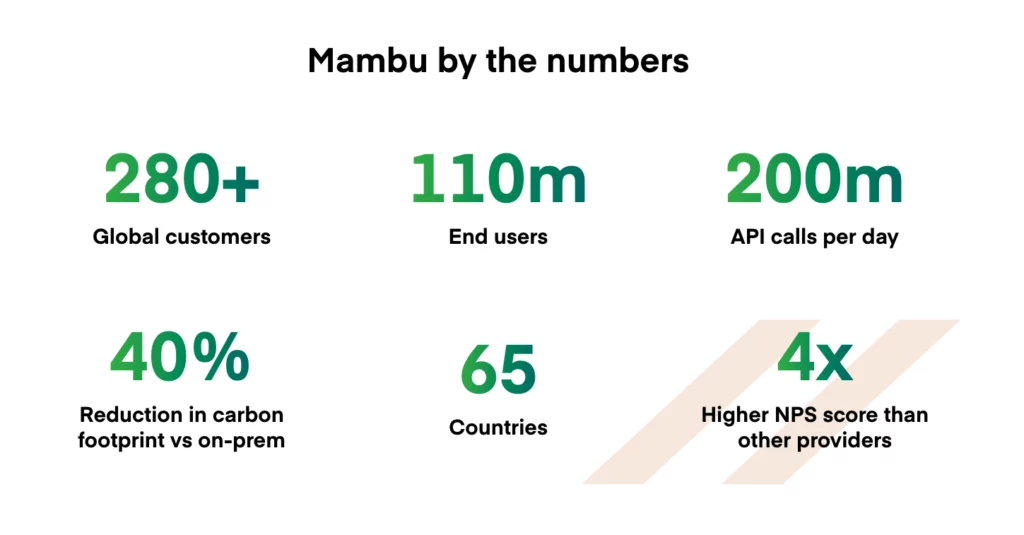
In recent years, the payments sector has seen swift advancements, accelerating the need for financial providers to continuously invest in their infrastructure to stay ahead of the curve. As a consequence, the expenses associated with managing and upkeeping payment systems are on the rise. According to Projective Group’s core banking survey, banks recognise that cooperation, outsourcing and partnering on a modular banking platform is a key strategy for saving costs and consolidating core banking activities.
In the Dutch market, multiple players operate in the core banking industry. The purpose of this article series is to interview various core banking providers, to show what these players offer and how they position themselves in the market.
Mambu: A cloud banking platform
Let us introduce you to Mambu. Mambu is based in the Netherlands and was founded in 2010. Mambu’s cloud banking platform enables banks, fintechs, retailers, corporates and others (such as telcos and breweries) to provide a variety of loan, deposit and daily banking offerings tailored to unique customer needs. Mambu serves over 250 customers in 65 countries on their platform with primarily retail and SME end users. With a growing client base in the Netherlands serving established financial institutions such as ABN AMRO, and a bank with a (SME) lending engine and a core banking replacement, Mambu cannot be ignored in the Dutch Core Banking Market.

How does Mambu’s Core Banking offering distinguish itself from other Core Banking providers?
Mambu embraces the “composable banking” approach which centres around customizing the product to meet the customer requirements through configuration. As the role of technology becomes more important in financial institutions, there will be increased expectations for performance, functionality and specialization. Therefore, it is impossible for a single company to achieve excellence in all fields of a bank’s architecture. According to Mambu, composable banking is now the industry standard and widely recognized as the best practice.
Composable banking, sounds interesting, but what does it mean?
Composable banking is a design method whereby software is built in a manner that anticipates future updates. The design is based on change, meaning that it can easily be mixed and matched with new software, even from other suppliers. In practical terms, this enables banks to adjust to product changes, such as instant payments, and changes in risk and compliance, such as PSD2, but being able to connect easily.
Composable banking is a design method whereby software is built in a manner that anticipates future updates.
How does Mambu help customers to build up towards a composable infrastructure?
Financial institutions with legacy IT infrastructures often face a long road in building up a composable infrastructure. Mambu assists in this respect by following a partner-led approach. Our ecosystem comprises system integrators, consultants and tech partners that all support and add value to Mambu customers by advising on or integrating the composable infrastructure. Partners bring the solutions and the project together, with Mambu Onboarding teams providing support in this process.
Mambu’s Onboarding team will guide our clients through the onboarding process. In a series of onboarding sessions, we will walk clients through the core functionality in the Mambu UI and will help clients to configure their initial setup so the organization can get up and running as fast as possible.
What do you see as the greatest challenge to banks in the field of core banking?
Mambu identifies two major challenges in the Dutch market. The first challenge is the functional Dutch specifics. Although the Netherlands is part of the European Union, it still has many Dutch-specific features, such as ‘overstapservice’, NL SCT Inst (Betaalvereniging), iDEAL etc. However, not all partners and solution providers want to extend their solutions with these capabilities for a relatively small market. Mambu’s cloud banking platform allows for flexibility to manage these specific requirements.
The second challenge is the volumes. The Dutch financial services sector is quite saturated, with only a few banks covering a large part of the market. Mambu’s composable banking philosophy promotes the use of “best-for-purpose” solutions, where the entire bank ecosystem should be able to scale. Mambu supports this from the core banking perspective, but it requires holistic support from the rest of the infrastructure.
And finally: If you had a crystal ball, what will have changed the most in the market, ten years from now?
Besides the conventional cloud and SaaS models, we have identified three developments that we expect to occur over the next ten years.
Platforms: Firstly, we anticipate a shift from core banking to financial platforms. With the rise of embedded finance, banking will no longer monopolise the use of banking technology like Mambu. This will lead to a diversified customer base across new industry verticals.
End of custom solutions: Secondly, customized, in-house built solutions will become a thing of the past due to the associated challenges becoming increasingly difficult to maintain (such as maintainability, operational risk, obsolescence, technical debt, etc.). Banks will redirect their resources from maintaining legacy infrastructures to new product development, relying on modern products to meet their needs.
Agility: Lastly, there will be a shift towards building for change instead of building for the long-term. The era of 20-year-old core banking systems will come to an end. Financial institutions are beginning to appreciate the strategic value of optionality and flexibility. As a result, flexible commercial arrangements with composable architectures will provide the most agile core banking operating model.
There will be a shift towards building for change instead of building for the long-term.
What about you?
As you can see, the world of finance is rapidly evolving, and composable banking is at the forefront of this transformation. By embracing the potential of composable banking, you open up a world of endless possibilities, agility, and innovation.
If you're ready to embark on this exciting journey get in touch with us. Our team of experts is well-versed in the intricacies of composable banking and can guide you through every step of the process.
About Projective Group
Established in 2006, Projective Group is a leading Financial Services change specialist. With deep expertise across practices in Data, Payments, Transformation and Risk & Compliance.
We are recognised within the industry as a complete solutions provider, partnering with clients in Financial Services to provide resolutions that are both holistic and pragmatic. We have evolved to become a trusted partner for companies that want to thrive and prosper in an ever-changing Financial Services landscape.



